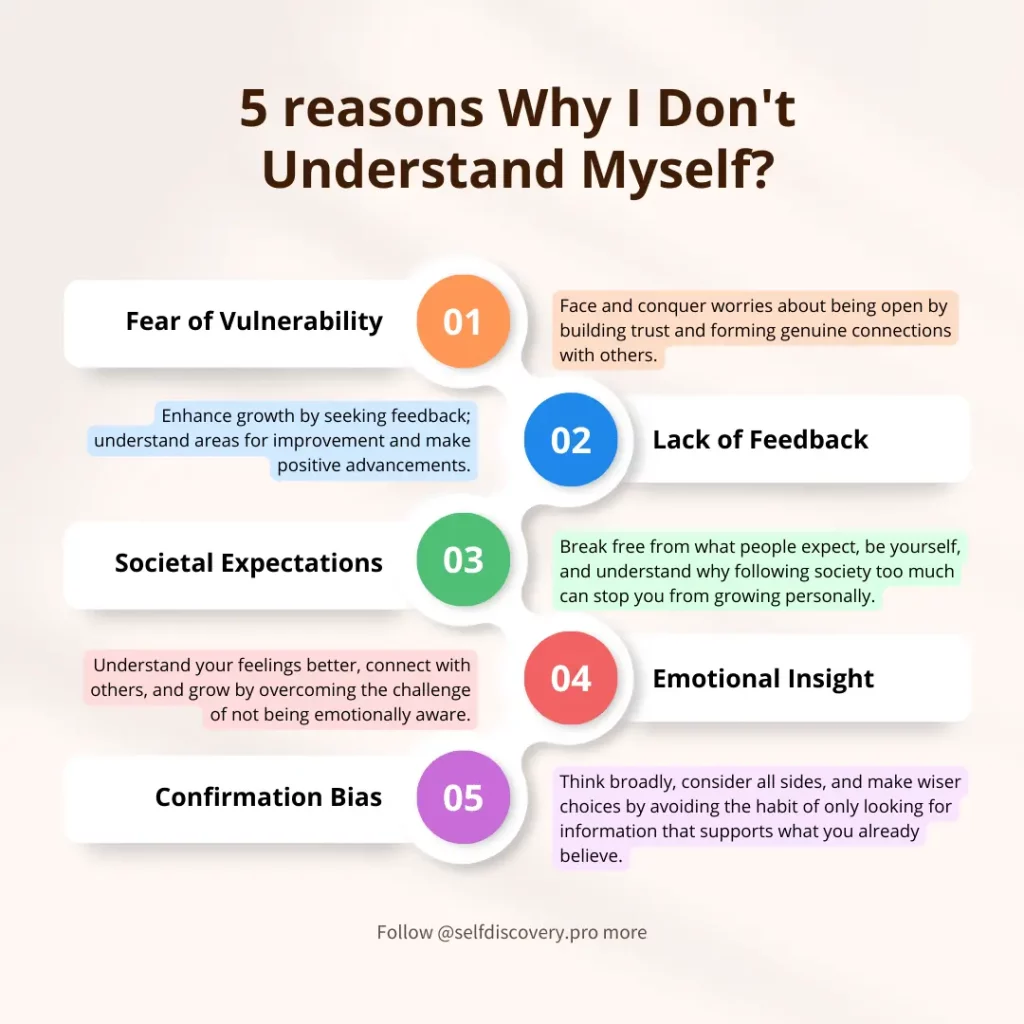Ever felt like your own thoughts are a bit of a puzzle, and you’re just there asking, “Why don’t I understand myself?”It’s a universal puzzle that hanging out in your mind. But no worries, we’re about to figure it out. Many of us struggle to understand ourselves, even though we spend our entire lives with ourselves. But why is this the case? And more importantly, what can we do about it?
In this articule , we’re breaking down why understanding ourselves is like solving a puzzle and tossing in some down-to-earth fixes to level up our self-awareness game. So, let’s get into it!
Decoding the Why: Why I Don’t Understand Myself?

Fear of Vulnerability
Understanding oneself often involves acknowledging one’s own weaknesses, insecurities, and mistakes. This can be a difficult and uncomfortable process, as it requires vulnerability. Brene Brown, a research professor at the University of Houston, defines vulnerability as “uncertainty, risk, and emotional exposure.” Many people avoid vulnerability because it can be uncomfortable, but avoiding vulnerability also means avoiding self-awareness and personal growth.
According to Brown’s research, vulnerability is essential for connection and belonging. When we avoid vulnerability, we also avoid authenticity and intimacy with others. Brown argues that embracing vulnerability is essential for building resilience and courage. She writes, “Vulnerability is the birthplace of innovation, creativity, and change” (Brown, 2012, p. 34).
Lack of Feedback
Feedback is an essential tool for self-awareness and personal growth. It allows us to see ourselves from different perspectives and gain insight into our strengths and weaknesses. However, many people do not receive regular feedback, either because they do not seek it out or because they are not in an environment that provides it. According to a study by Tasha Eurich, people who receive regular feedback are more likely to be self-aware and perform better at work.
Eurich argues that feedback is most effective when it is specific, timely, and focused on behavior rather than personality. She writes, “Feedback should be timely, specific, and focused on behaviors rather than personality traits. It should also be balanced, highlighting both strengths and areas for improvement” (Eurich, 2018, p. 111).
Cultural and Societal Expectations
I think Cultural and societal expectations can also make it difficult to understand oneself. According to a study by Jean Twenge and W. Keith Campbell, individualism has increased in Western cultures over the past few decades, leading to a greater emphasis on personal identity and self-expression. However, this can also create pressure to conform to certain expectations and stereotypes.
To be nobody-but-yourself – in a world which is doing its best, night and day, to make you everybody else – means to fight the hardest battle which any human being can fight; and never stop fighting.” – E.E. Cummings
Twenge and Campbell argue that this pressure can make it difficult to develop a coherent sense of self. They write, “The increasing emphasis on individualism and self-expression may actually make it harder for people to develop a stable sense of self, as they are constantly bombarded with messages about who they should be and what they should want” (Twenge & Campbell, 2009, p. 122).
Confirmation Bias
Confirmation bias is the tendency to seek out information that confirms one’s existing beliefs and ignore information that contradicts them. This can make it difficult to understand oneself, as it can lead to a distorted view of reality. According to a study by Raymond Nickerson, confirmation bias is a pervasive cognitive bias that affects people in many different areas of their lives, including their self-perceptions.
Nickerson argues that confirmation bias can be particularly problematic when it comes to self-assessment. He writes, “When people are asked to assess their own abilities or performance, they tend to seek out and give greater credence to information that confirms their positive self-views than to information that might challenge those views” (Nickerson, 1998, p. 175). This can make it difficult to identify areas for improvement and make necessary changes.
Lack of Emotional Intelligence
Another reason why people may struggle to understand themselves is a lack of emotional intelligence. Emotional intelligence involves the ability to recognize, understand, and manage one’s own emotions, as well as the emotions of others. According to the book “Emotional Intelligence: Why It Can Matter More Than IQ” by Daniel Goleman, emotional intelligence is a critical factor in personal and professional success.
Emotional intelligence is the ability to recognize, understand, manage, and use emotions in positive ways to relieve stress, communicate effectively, empathize with others, overcome challenges and defuse conflict.” – Daniel Goleman
Goleman argues that people who are emotionally intelligent are better able to understand their own emotions and how those emotions impact their thoughts and behaviors. They are also better able to regulate their emotions, which can help them respond to situations in a more effective and productive way.
Cracking the Code: Solutions for “Why I Don’t Understand Myself”
Improve your empathy and communication skills
- Recognize that others may have different perspectives and emotions than your own.
- Practice active listening and empathy to better understand the emotions and needs of others.
- Communicate your own emotions and needs clearly and respectfully.
- For example, if you are in a conflict with a coworker, you may benefit from practicing active listening to understand their perspective and expressing your own needs in a clear and respectful way.
- Practice active listening when receiving feedback. This means focusing on the other person’s words and nonverbal cues, rather than planning your response.
- Try to understand the other person’s perspective and emotions. For example, you may realize that the feedback is intended to be helpful and constructive, rather than critical.
- Communicate your own emotions and needs clearly and respectfully. For example, you may say “I appreciate your feedback. I feel a bit defensive right now, but I’m committed to learning and improving.
Ask for feedback
- Seek feedback from trusted friends, family members, or colleagues to gain a different perspective on your behavior and identify areas for improvement.
- Choose people who you trust and who will be honest with you, but also kind and supportive.
- Be open to hearing their feedback, even if it’s difficult or uncomfortable. Remember that their perspective can help you see yourself more objectively and make positive changes.
- Thank them for their feedback and let them know how it will help you grow.
Practice self-compassion
- Be kind and compassionate towards yourself when engaging in self-reflection.
- Instead of being overly critical or harsh, focus on being honest and understanding with yourself.
- Remember that everyone makes mistakes and has flaws. Acknowledge them, but also celebrate your strengths and accomplishments.
- Use positive self-talk and affirmations to encourage yourself and build self-confidence.
- If you find yourself being overly critical, try to reframe your thoughts in a more positive way. For example, instead of saying “I’m so stupid for making that mistake,” say “I made a mistake, but I can learn from it and do better next time.”
“The most important conversation you’ll ever have is the one you have with yourself.” – Unknown
Challenge and question cultural and societal expectations
- Recognize that cultural and societal expectations are not always universal truths and can vary between different communities.
- Reflect on whether these expectations align with your personal values and beliefs.
- Challenge and question these expectations when they do not align with your personal values and beliefs.
For example, if you come from a culture that values conformity and discourages individuality, you may feel pressure to suppress your own thoughts and feelings. By recognizing that this is a cultural expectation, you can begin to question whether it aligns with your own values and seek out alternative perspectives.
Confirmation Bias: Practice critical thinking and seek out diverse perspectives
- Recognize that your own biases and assumptions can influence your interpretation of information.
- Actively seek out information that challenges your beliefs and assumptions.
- Engage in respectful dialogue with people who hold different opinions.
For example, if you tend to surround yourself with people who share your political beliefs, you may be limiting your exposure to opposing viewpoints. By seeking out diverse perspectives, you can challenge your own biases and develop a more nuanced understanding of complex issues.
Practical Example:
Let’s say you’re struggling to understand why you always feel anxious before giving presentations. Here’s how you can apply these solutions:
- Set aside time for self-reflection: Take 10 minutes each day to journal about your thoughts and feelings. Reflect on what triggers your anxiety and what you can do to manage it.
- Ask for feedback: Ask a trusted colleague or friend for feedback on your presentation skills. They may be able to identify areas where you can improve and offer suggestions for managing your anxiety.
- Practice self-compassion: Be kind and understanding with yourself. Remember that everyone gets nervous before presentations, and it’s okay to feel anxious. Use positive self-talk and affirmations to build your confidence and remind yourself of your strengths.
- Cultural and societal expectations: Let’s say you come from a culture that values modesty and discourages open displays of emotion. You may feel uncomfortable expressing your emotions, even in situations where it would be appropriate or beneficial to do so. This cultural expectation can impact your self-understanding by causing you to suppress your own needs and feelings.
- Seek out diverse perspectives: Engage in respectful dialogue with people who have different experiences and perspectives on social situations. For example, you may find that others feel anxious in social situations as well and can offer coping strategies or reassurance that you are not alone.
- Practice active listening and empathy: if a coworker is expressing frustration about a project, you may respond by saying “I understand why you’re feeling that way, and I appreciate your perspective. Let’s work together to find a solution.” By practicing active listening and empathy, you can improve your emotional intelligence and build stronger relationships with others.
References
- Tugade, M. M., Fredrickson, B. L., & Barrett, L. F. (2004). Psychological resilience and positive emotional granularity: Examining the benefits of positive emotions on coping and health. Journal of personality, 72(6), 1161-1190.
- Smith, K. C., & Carlson, R. (1997). Forgive to live: The spiritual, medical, and psychological benefits of letting go. Thomas Nelson.
- Neff, K. D. (2003). Self-compassion: An alternative conceptualization of a healthy attitude toward oneself. Self and identity, 2(2), 85-101.
- Kross, E., Ayduk, O., & Mischel, W. (2005). When asking “why” does not hurt: Distinguishing rumination from reflection in the prediction of negative and positive emotional outcome. Personality and Social Psychology Bulletin, 31(11), 1461-1476.
- Brown, B. (2012). Daring greatly: How the courage to be vulnerable transforms the way we live, love, parent, and lead. Gotham Books.


